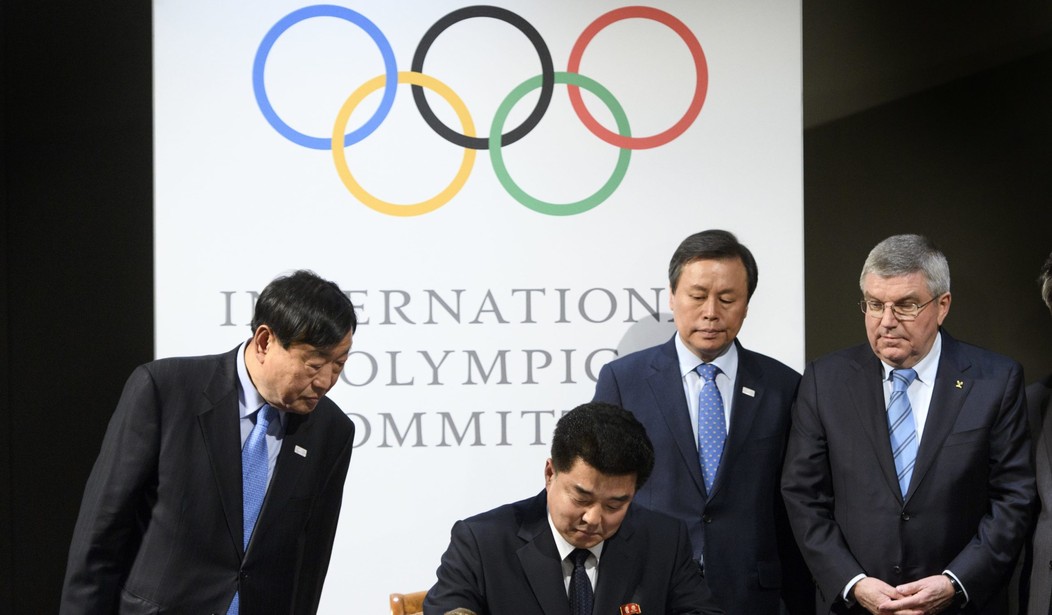WASHINGTON – A scheduled display of unification between North Korea and South Korea at the Pyeongchang Olympics is the result of blackmail, Rep. Steve Chabot (R-Ohio) said Wednesday while discussing U.S. absence from the recent talks between the Korean nations.
North and South Korea announced last week that representatives from both countries will march under a unified Korean flag, which the two countries have done at numerous sporting events since 1991, including the 2006 Winter Games in Turin, Italy. Skiers from both countries also plan to train together, and the Koreas will co-roster a women’s ice hockey team. The Games are set to begin Feb. 9 in South Korea.
“It’s blackmail. It’s fraud. It’s a sham, in my view,” Chabot, chairman of the Subcommittee on the Middle East and South Asia, said during a joint subcommittee hearing of the House Foreign Affairs Committee. “South Korea is concerned that North Korea is going to screw up the Olympics for them, and North Korea is going to get everything they can out of this, as they always do.”
South Korean officials have repeatedly warned against the potential escalation of war between the U.S. and North Korea, for the consequences it could bring to Seoul, where 25 million people live. Projections estimate that several hundred thousand people would die in the opening days of a full-scale attack on Seoul, where thousands of Americans are stationed.
Rep. Brad Sherman (D-Calif.) cautioned against “stumbling” into war with North Korea, while describing the rhetoric between Trump and Kim Jong-un as “adolescent boys at a junior high school.”
“The idea that we could bloody the nose of our adversary without risk to the Korean Peninsula and the world is absurd,” Sherman said.
Rep. Dana Rohrabacher (R-Calif.) responded with a fiery attack on Democrats for their criticisms of Trump. He asked why people are targeting the president of the United States when Kim is leading the “worst God-awful dictatorship in the world.”
“I don’t care – this guy is our president,” Rohrabacher said. “Yeah, he’s got some eccentricities. You think you’re going to make war any less by attacking him instead of the enemy? Instead of this guy who has murdered his own family and murdered countless people to maintain power in Korea?”
The California Republican said that attacks on the president at this moment, when leadership in South Korea is cooperating with North Korea, at least for the Olympics, is misguided.
“Seems to me the president calling him ‘rocket man’ – and ‘I’ve got a bigger button to push than he does’ – maybe had the positive impact because that’s what happens with gangsters,” Rohrabacher said. “If you deal with them forcefully and you put them down, they will respond to that.”
Rohrabacher then blamed the Clinton administration for freeing up “$4 billion” worth of oil money to the previous regime. He said that Kim has used that money to build up his intercontinental ballistic missile program. He also said it’s unfair to criticize Trump after President Obama freed up an estimated $150 billion in finances for Iran through the multilateral nuclear agreement in 2015.
After Rohrabacher’s speech, Rep. Gerry Connolly (D-Va.) asked for 30 seconds to respond.
“I find it ironic that in the midst of criticizing people for criticizing Mr. Trump my colleague then goes onto criticize previous presidents, all Democrats,” Connolly said. “I would simply assert that in a democracy we get to criticize an administration, and thank God for that. That’s a right not allowed in the North Korea regime. It is still allowed here, and I and my colleagues on this side of the aisle intend to exercise it.”
Chabot during his opening remarks echoed a conclusion from many other lawmakers: the key to the North Korean nuclear threat is China. Sherman pointed out that last September, Rep. Ed Royce (R-Calif.) identified several Chinese banks, including the China Merchants Bank and the state-owned Agricultural Bank of China, as doing sanctionable business with North Korea. Rep Ted Yoho (R-Fla.) and Sherman also wrote to the Treasury Department identifying several similar-sized Chinese banks, including the Industrial and Commercial Bank of China, the largest bank in the world, and the Bank of Communications. The executive branch has failed to pull the trigger on any sanctions, Sherman said.
“Why have we put preserving the $500 billion, $400 billion trade deficit with China, and all the profits that that generates, above our national security?” Sherman asked. “How do we get the administration to get serious with the big banks?”









Join the conversation as a VIP Member